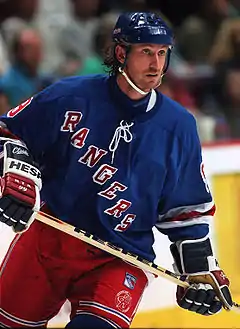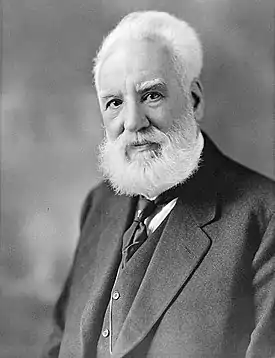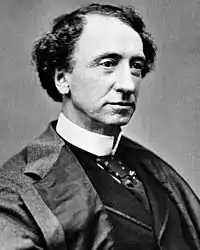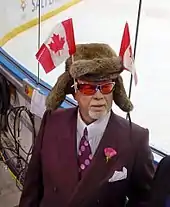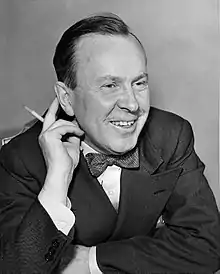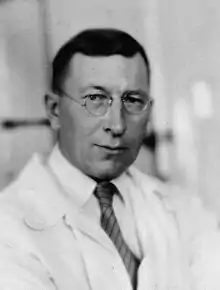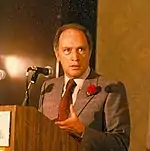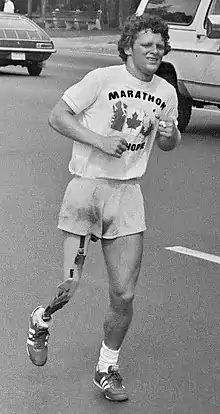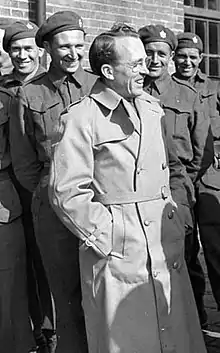The Greatest Canadian
The Greatest Canadian was a 2004 television series consisting of 13 episodes produced by the Canadian Broadcasting Corporation (CBC) to determine who is considered to be the greatest Canadian of all time, at least according to those who watched and participated in the program.[1]
| The Greatest Canadian | |
|---|---|
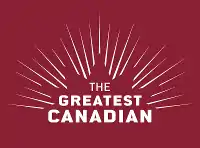 The Greatest Canadian logo | |
| Genre | Documentary |
| Developed by | Canadian Broadcasting Corporation |
| Written by | Gary Pearson |
| Directed by | Guy O'Sullivan |
| Country of origin | Canada |
| No. of episodes | 13 |
| Release | |
| Original release | 17 October 2004 |
The series two hour debut on October 17, 2004 garnered more than one million viewers, with approximately 500,000 to 700,000 viewers per episode thereafter.[2] The initial nomination phase received more than 10,000 names submitted for consideration.[3] The second phase of the process concluded on November 28 at midnight and the following evening the winner from more than 1.2 million votes was revealed to be Tommy Douglas.[4][5]
The series was inspired by the BBC production the Great Britons and has a spiritual sequel, The Greatest Canadian Invention.
Selection process
The "Greatest Canadian" was chosen through a two-step voting process. The first phase beginning on April 5, 2004, involved the collection of data (nominees for consideration) through polls conducted by mail, phone and the internet.[5] Of these nominees the bottom 40 of 50 individuals, in order of popularity, were revealed during the first episode in October.
The criteria for eligible as outlined by the CBC was broad:[3]
Born in what is now Canada, or born elsewhere but lived here and made a significant contribution to this country - real (no fictional characters or animals) - an individual (no pairs, or groups).
To prevent bias during the second round of voting; the top ten nominees, also revealed during the first episode, were presented alphabetically rather than by order of first round popularity.[5] This phase was accompanied by a series of hour-long feature documentaries, where 10 Canadian celebrities acting as advocates each presented their case for The Greatest Canadian.[1] Viewers then submitted votes over the next six weeks supporting their favorite finalists.
Top 10
On October 17, 2004 the top 10 nominees were revealed at the end of the first episode in alphabetical order.[6] The winner and all finalists were announced by popularity on November 28 and 29 in a three hour two part series conclusion.[7][6]
Top 50
More than 10,000 names were submitted for consideration with the top 100 individuals being revealed online accompanied with a short biography.[10] Of the 100 only the top 50 nominees were featured during the televised broadcast.[2]
At least three* members of the top 50 were nominees as the direct result of an active mass-mailing campaign among that individual's loyal and well-organized followers. Kin Canada founder Harold A. Rogers, DJ Hal Anderson, and Baha'i activist Mary Maxwell all benefitted from a grassroots campaign to get their names included in the nominees list.[11] CBC openly admitted this during the broadcast, recognizing that these three esoteric individuals are probably quite unknown to the general public.[2]
Critics have complained there were only four women and three nonwhites in the top 50, French Canadian participation was very low and that a large number of modern pop culture celebrities made the list like; Bret Hart, Mike Myers, John Candy, Jim Carrey and Avril Lavigne.[2] Contemporary icons chosen may be reflective of a youthful voting demographic, as the production was family oriented, or there was unwillingness or confusion distinguishing modern popularity with national historic significance among the participants of all ages.[2] In particular, Don Cherry's inclusion in the top 10 upset many Canadians, especially considering it forced out figures they believe more worthy like Louis Riel and Jean Vanier.[2]
| Rank[10] | Name | Notability |
|---|---|---|
| 11 | Louis Riel | politician, metis leader |
| 12 | Jean Vanier | humanitarian, founder of L'Arche, author |
| 13 | Stompin' Tom Connors | singer, songwriter |
| 14 | Neil Young | singer, guitarist, organist |
| 15 | Peter Gzowski | broadcaster, writer, reporter |
| 16 | Roméo Dallaire | general, humanitarian, author |
| 17 | Stephen Lewis | politician, broadcaster, diplomat |
| 18 | Shania Twain | singer, songwriter |
| 19 | Bobby Orr | ice hockey player |
| 20 | Mike Myers | actor, comedian, writer, producer |
| 21 | Unknown Soldier | soldiers |
| 22 | Harold A. Rogers * | founder of Kin Canada |
| 23 | Maurice Richard | ice hockey player |
| 24 | Sir Arthur Currie | commander, general |
| 25 | Nellie McClung | feminist, social activist |
| 26 | Dr. Norman Bethune | physician, medical innovator, humanitarian |
| 27 | Céline Dion | vocalist, entertainer |
| 28 | Sir Isaac Brock | major-general |
| 29 | Jim Carrey | film actor, comedian, writer, producer |
| 30 | Rick Hansen | parapalegic athlete, humanitarian |
| 31 | Pierre Berton | author, television personality |
| 32 | Michael J. Fox | actor, activist |
| 33 | Gordon Lightfoot | folk singer, composer, lyricist |
| 34 | Hal Anderson * | broadcaster |
| 35 | Laura Secord | national heroine |
| 36 | Ernie Coombs | children's entertainer |
| 37 | Tecumseh | indigenous leader |
| 38 | Mario Lemieux | ice hockey player |
| 39 | Bret Hart | professional wrestler |
| 40 | Avril Lavigne | singer, songwriter |
| 41 | John Candy | comedian, actor |
| 42 | Sir Sandford Fleming | engineer, inventor |
| 43 | Sir Wilfrid Laurier | prime minister |
| 44 | Mary Maxwell * | Baha'i follower |
| 45 | Jean Chrétien | prime minister |
| 46 | Leonard Cohen | poet, novelist, folk singer, songwriter |
| 47 | John George Diefenbaker | prime minister |
| 48 | Billy Bishop | WW1 flying ace |
| 49 | William Lyon Mackenzie King | prime minister |
| 50 | Rick Mercer | comedian, broadcasting personality |
Other editions
Other countries have produced similar shows based on the format originated by the BBC. The Tomb of the Unknown Soldier and Alexander Graham Bell were also featured on the 100 Greatest Britons list.[2] A two-hour spin-off series called The Greatest Canadian Invention aired in 2007 with Insulin as the winner.[12]
See also
References
- "And the Greatest Canadian of all time is…". CBC Archives. 2005.
- "The Greatest Canadians of CBC".
- The Greatest Canadian criteria CBC 2010 (Archive webpage)
- Sheila A Sorrentino; Leighann Remmert, MS RN; Mary J Wilk (2016). Mosby's Canadian Textbook for the Support Worker - E-Book. Elsevier Health Sciences. p. 23. ISBN 978-1-77172-107-3.
- "Tommy Douglas crowned 'Greatest Canadian". CBC/Radio-Canada. 2004.
- The Greatest Canadian schedule CBC 2010 (Archive webpage)
- "Who is The Greatest Canadian? CBC viewers respond". The Canadian Broadcasting Corporation. 2010. Retrieved 21 June 2010.
- The Greatest Canadian top 100 CBC 2010 (Archive webpage)
- The Greatest Canadian advocate CBC 2010 (Archive webpage)
- The Greatest Canadian top 100 CBC 2010 (Archive webpage) - PDF list
- "The greatest Canadian" – via The Globe and Mail.
- "The Greatest Canadian Invention". CBC. 2007. Archived from the original on 17 February 2007. (Archive webpage)
